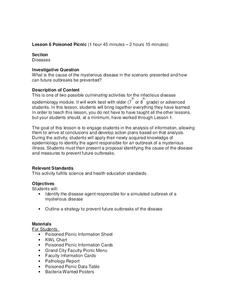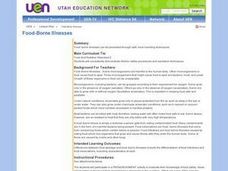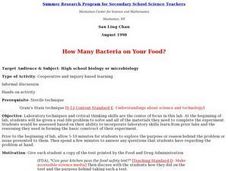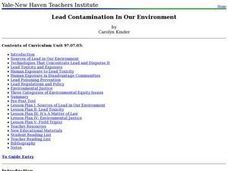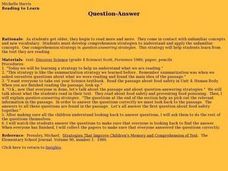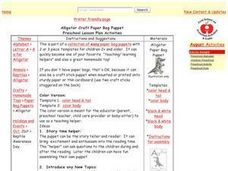Centers for Disease Control and Prevention
Poisoned Picnic
A group of teachers attended a picnic; ten became sick and another four died. Young scholars must solve the mystery of what happened. They research the river, waste water treatment plant, each food that was served, and environmental...
Curated OER
Food Poisoning
Students study the prevention of the four major types of food poisoning. They write a letter of advice to an imaginary friend who has had food poisoning seven times within the last year.
Curated OER
Food-Borne Illnesses
Use this instructional activity to have your charges consider the differences between food spoilage and food-borne illnesses including the differentiation of food infections and food intoxication, including characteristics of each. Some...
food.uk.gov
Kitchen Check
Storing the food in the fridge, keeping the kitchen clean, and preparing food correctly are the focus topics of this food safety resource. It includes well-designed handouts with top tips to remember, coloring worksheets, and answer keys.
Curated OER
Microbes and Our Food
Students investigate foodborne illnesses and involved microbes. They identify major pathogens and then research and explain how they contaminate foods and how people are affected.
Curated OER
Food Poisoning
Identify strategies that prevent food-borne illnesses and contamination. National Standard 14.4.1 Identify food-borne illness Identify types of food-borne illness and their symptoms: botulism, e-coli, hepatitis, salmonella, staphylococci...
Curated OER
Food Poisoning
Students study the bacteria that cause food poisoning using a written resource. They complete a research worksheet entitled, "America's Most Wanted." Next, they create a short skit about the causes, symptoms, prevention, and other...
Curated OER
How Many Bacteria on Your Food?
Students discuss and conduct a food safety experiment which looks at bacteria and food poisoning. They swab the other area of some food and grow bacteria in an agar plate.
Curated OER
Hands of Doom
Students discuss the four essential step used for safe food handling: clean, separate, cook, and chill. They identify the bacteria that can cause food poisoning, practice how to properly wash hands before and after handling food,...
Curated OER
Health: Food Borne Illnesses
Students discover how to inhibit food borne illnesses by practicing safe food-handling techniques. Among topics they examine are the advantages and disadvantages of using wooden or plastic cutting boards. After studying for the test,...
Curated OER
Safe and Sanitary Work Habits - Level 1
Students brainstorm hazards in the kitchen, and categorize them. They develop a checklist that could be used by an inspector to evaluate a home economics foods laboratory. They create a recipe while using proper lab and safety procedures.
Curated OER
How Did That Get in My Lunch?
Middle schoolers view "The Danger Zone" to learn about food poisoning and the bacterial causes and prevention. Students look at slides, use a worksheet, "Microbial Bugs"and the internet to identify and learn about each bacterium.
Curated OER
Safe Work Habits and First Aid - Level II
Identify and explain the appropriate use and care of basic kitchen equipment. Locate food preparation equipment in the laboratory Identify various types of kitchen equipment Select appropriate equipment for specific product preparation...
Curated OER
Diseases of the Oregon Trail
Young scholars identify diseases that plagued the pioneers and find preventative measures to avoid them. In this Oregon Trail lesson plan, students brainstorm possible health problems and diseases for pioneers. They then research a...
Curated OER
Lead Contamination In Our Environment
Students identify the sources of lead in their local community and how to prevent further contamination. As a class, they watch a video about the effects of lead on the body and use the internet to discover any new technology that can...
Curated OER
"Keep it cool"
Students comprehend the importance of keeping cold foods cold. They identify the proper way to install and read a fridge thermometer. Students develop the ability to maintain a clean fridge at home.
Curated OER
Hand Washing
Mostly discussion, this instructional activity explores the importance and methods of hand washing. A few true stories of community illnesses spread by the neglect of washing hands serve as an anticipatory set. The activity is most...
Curated OER
Foodborne Illness Outbreak Investigation
Learners demonstrate how epidemiological investigations of outbreaks are performed. They illustrate the principles of hypothesis formation and testing by epidemiologic study in the setting of an acute foodborne disease outbreak.
Calvin Crest Outdoor School
Survival
Equip young campers with important survival knowledge with a set of engaging lessons. Teammates work together to complete three outdoor activities, which include building a shelter, starting a campfire, and finding directions in the...
Curated OER
Question - Answer
Students use the comprehension strategy question-answer to improve reading comprehension. They read a passage out of their textbook, and the teacher models the question/answer strategy by asking about key points mentioned in the reading.
Curated OER
Alligator Craft Paper Bag Puppet
Pupils make paper bag puppets. They use the puppets as a story teller and reader. Students use the puppets to ask questions during and after reading. They assemble their own puppet. Pupils use the puppets to introduce new themes, such as...
Curated OER
EPA Pesticides Reduction
Young scholars examine the effects of pesticides on the environment and bugs. They answer questions as an assessment.
Curated OER
Cell 7 Plant v Animal Cells
Students differentiate between plant and animal cells. They identify the structures central to plant cells. They complete a Venn Diagram listing the differences between animal and plant cells.
Curated OER
Water Pollution
Students explore the causes of water pollution. In this environmental lesson, students conduct experiments with natural filtration systems.


